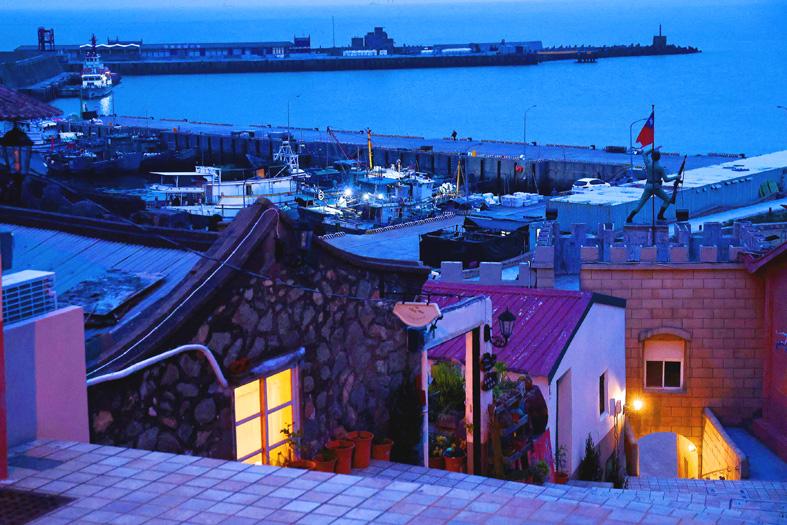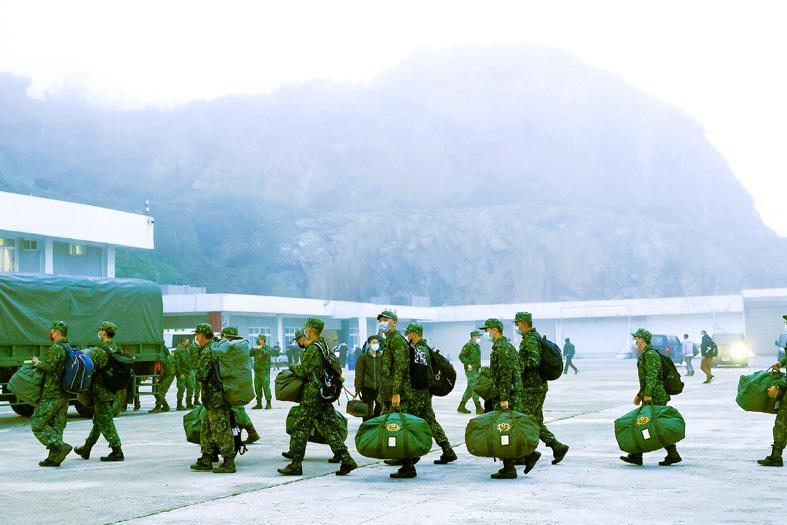Lin Jih-shou was brewing tea last month in his popular breakfast joint when he heard the buzz of a plane — a rare sound on Dongyin Island (東引), which does not have an airport.
Lin, 64, rushed outside, but only saw the shadow of what the government later described as a small, propeller-driven Chinese aircraft that most likely was testing Taiwan’s military response.
It was a stark reminder to residents of Dongyin and other islands off China’s coast of the threat from their huge neighbor.

Photo: Ann Wang, Reuters
The Matsu Islands were regularly bombarded by China at the height of the Cold War, and the history of conflict has focused minds on Russia’s invasion of Ukraine and whether the same fate might befall them.
“When we watch Russia and Ukraine fighting, our hearts hurt,” Lin said. “War is too scary. There’s no need.”
Held by Taiwan since the Chinese Nationalist Party (KMT) regime fled China in 1949 after losing the Chinese Civil War, Matsu would probably be an immediate target for Beijing in a conflict, especially Dongyin’s missile base.

Photo: Ann Wang, Reuters
Yet even with China’s increased military pressure over the past few years, the archipelago has seen trendy businesses and a nascent art scene spring up.
On the main island of Nangan (南竿), former military brothels and underground bunkers house exhibitions that opened last month as part of the inaugural Matsu Biennial art festival.
Outlying islands are being reframed as “a front line of democracy,” said Lii Wen, who established the local branch of the Democratic Progressive Party in 2020.
Dongyin native Tsai Pei-yuan, born in 1993, the year after Matsu’s strict military rule ended, is part of a generation for whom war feels distant.
Two years ago, Tsai and two former classmates cofounded Salty Island Studio, a cafe and community hub that hosts arts workshops and plays.
“More urgent is trying to preserve our culture, which is disappearing,” Tsai said before a wine-tasting event last week.
The Ukraine war is a common topic of conversation for some — including jokes about where to hide if China invades.
“When we explore strongholds, we ask, if a war really starts, which nearby stronghold would we run to?” said Chung Jing-yei, 26, who manages a restaurant.
Chung said it was only after she moved to Nangan that she understood why so many here want to maintain the “status quo.”
“My belief that we should be an independent country is resolute, but at the same time, I don’t want war to happen,” she said.
Dotting the islands’ rugged coastlines are bunkers, abandoned or transformed into tourist destinations and boutique hotels.
Older Matsu residents have vivid memories of hiding in shelters from Chinese shelling and not being allowed to own basketballs for fear that they might use them to float across to China.
“I don’t think the two sides will fight,” said Lucy Lin, a 62-year-old taxi driver and bakery owner. “As long as you don’t step over the red lines.”

Taiwan is stepping up plans to create self-sufficient supply chains for combat drones and increase foreign orders from the US to counter China’s numerical superiority, a defense official said on Saturday. Commenting on condition of anonymity, the official said the nation’s armed forces are in agreement with US Admiral Samuel Paparo’s assessment that Taiwan’s military must be prepared to turn the nation’s waters into a “hellscape” for the Chinese People’s Liberation Army (PLA). Paparo, the commander of the US Indo-Pacific Command, reiterated the concept during a Congressional hearing in Washington on Wednesday. He first coined the term in a security conference last

Prosecutors today declined to say who was questioned regarding alleged forgery on petitions to recall Democratic Progressive Party (DPP) legislators, after Chinese-language media earlier reported that members of the Chinese Nationalist Party (KMT) Youth League were brought in for questioning. The Ministry of Justice Investigation Bureau confirmed that two people had been questioned, but did not disclose any further information about the ongoing investigation. KMT Youth League members Lee Hsiao-liang (李孝亮) and Liu Szu-yin (劉思吟) — who are leading the effort to recall DPP caucus chief executive Rosalia Wu (吳思瑤) and Legislator Wu Pei-yi (吳沛憶) — both posted on Facebook saying: “I

Sung Chien-liang (宋建樑), who led efforts to recall Democratic Progressive Party (DPP) Legislator Lee Kun-cheng (李坤城), was released on bail of NT$80,000 today amid outcry over his decision to wear a Nazi armband to questioning the night before. Sung arrived at the New Taipei District Prosecutors’ Office for questioning in a recall petition forgery case last night wearing a red armband bearing a swastika, carrying a copy of Adolf Hitler’s Mein Kampf and giving a Nazi salute. Sung left the building at 1:15am without the armband and covering the book with his coat. Lee said today that this is a serious

A mountain blaze that broke out yesterday morning in Yangmingshan National Park was put out after five hours, following multi agency efforts involving dozens of fire trucks and helicopter water drops. The fire might have been sparked by an air quality sensor operated by the National Center for High-Performance Computing, one of the national-level laboratories under the National Applied Research Laboratories, Yangmingshan National Park Headquarters said. The Taipei City Fire Department said the fire, which broke out at about 11am yesterday near the mountainous Xiaoyoukeng (小油坑) Recreation Area was extinguished at 4:32pm. It had initially dispatched 72 personnel in four command vehicles, 16